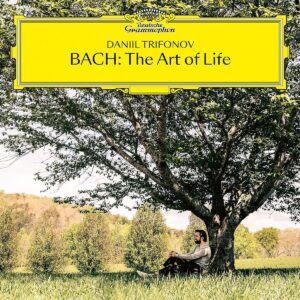The Art of Life comprises a kind of double bill. It begins with a family portrait, first through the voices of J.S. Bach’s sons Johann Christian, Wilhelm Friedemann, Carl Philipp Emanuel, and Johann Christoph Friedrich, followed by works by family members and friends included in the 1725 notebook that J.S. Bach presented to his wife Anna Magdalena. If you think that this repertoire doesn’t suit a modern concert grand, you haven’t reckoned with Daniil Trifonov.
His light touch and supple fingerwork conveys extraordinary character and vivacity. Listen to the dashing runs and perfectly calibrated fast trills throughout J.C.F. Bach’s delightful “Twinkle, Twinkle Little Star” Variations, the subtle harmonic pointing in the C.P.E Bach Rondo, or the poignant lyricism the pianist brings out in the W. F. Bach Polonaise, and you’ll hear what I mean.
Trifonov broadens his tone and expands his dynamic compass for Bach’s D minor Chaconne in Brahms’ left-hand transcription. Although I admire Trifonov’s serious demeanor and sense of continuity, his interpretation is a bit monotonous; I expected more variety of articulation and mood, as one hears from Leon Fleisher and Ivan Ilic.
Variety, however, is the key element in how Trifonov approaches The Art of Fugue. One easily can grow fatigued hearing so many pieces in D minor with a common theme. Trifonov circumvents this issue by imparting a unique character and sound world to each contrapunctus. The opening fugue, for example, is a model of grace and flexibility, while the dotted rhythms of No. 2 have an almost Mendelssohnian litheness. No. 4 breezes by in a flash, while No. 5 is fluidly inward (does Trifonov keep the una corda pedal down throughout?). The pianist’s octave doublings and grandiloquent tempo for the “French style” No. 6 will make Angela Hewitt’s fans duck for cover.
I love how Trifonov shapes each of the three-note phrases of No. 11’s first theme slightly differently, yet I’m less convinced by his dynamic builds, where his amplified textures somehow dissipate the effect of Bach’s amazing chromatic harmony. He plays the Canon at the Fifth more deliberately and lyrically than one often hears, while conversely skating through the Canon at the Third, where I anticipated a less conservative cadenza at the end.
One might describe Trifonov’s completion of the unfinished Contrapunctus 14 as “gentle Busoni”, in regard to its gothic octaves and rapt introspection. In fact, Trifonov’s reading of the completed text incorporates an effective degree of legato phrasing and liberal pedaling. In this sense, it’s surprising to hear such a heavy-gaited Bach/Hess “Jesu, Joy”, with emphatic bass lines and downbeats–a far cry from the gorgeously fluent recordings by Dinu Lipatti and, of course, Myra Hess herself. Despite my quibbles over specific interpretive issues, I must acknowledge that Trifonov realizes his conceptions with thoroughness, clarity, and authority, abetted by DG’s splendid engineering.
































